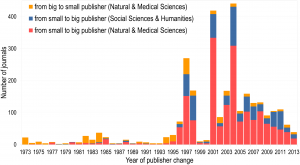Two independent British researchers have obtained and released data on the licensing fees spent on journal subscriptions in the UK higher education sector. The data, released openly on F1000Research, shows spending by over 150 UK higher education organisations on the journals from ten publishing groups, reaching a total of £430 million from 2010 – 2014. The data, being open, allowed me to do some quick calculations. Across these institutions the total spend in each year showed a steady increase over the five years: £76m, £82m, £88m, £91m and £94 respectively.
These figures are, of course, separate from anything spent on Author Processing Charges now being spent by UK insitutions to comply with goverment-mandated open access to publicly-funded research, which has become a significant cost in itself with the UK government’s support for the Gold OA model.
You can compare 2013 figures to publicly released figures for New Zealand institutions. The highest figure paid among the UK institutions that year was the £3.1 million spent by the University of Manchester. The University of Auckland was the biggest spender of New Zealand institutions in the same year at $14.8 million. The figures are not directly comparable – given that the UK’s include licensing fees for ten specific publishers and the NZ figures are for all spending on academic journal subscriptions — but do provide a broad basis for comparison. Similarly the total spends make interesting reading, with the UK’s £91 million spread across 153 institutions and NZ’s $55 million across just eight universities and eight Crown Research Institutes.


